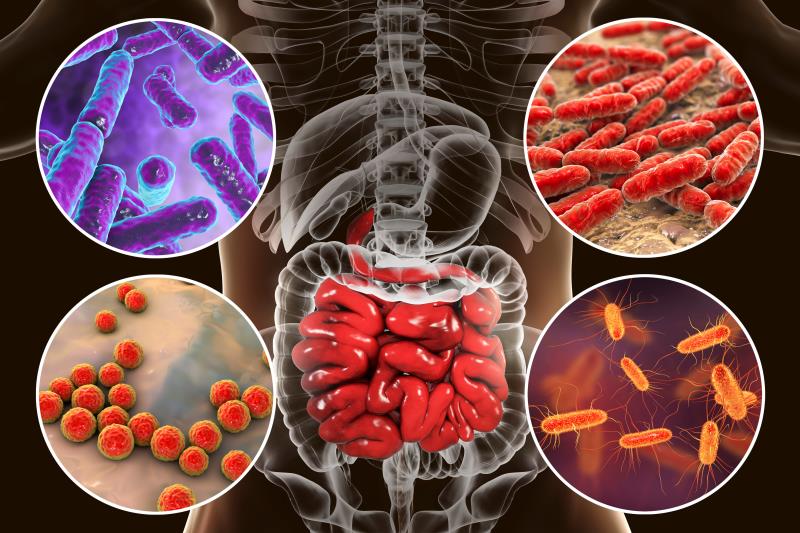
Faecal microbiota transplantation (FMT) is effective in reducing symptoms of irritable bowel syndrome (IBS), but having a “super-donor” is key, a study presented at UEG* Week has shown — highlighting the importance of donor selection for the success of FMT as a treatment for IBS.
“A ‘super-donor’ is someone who is normobiotic (ie, having a normal diversity of bacteria) and has a positive microbial signature,” explained Professor Magdy El-Salhy of Haukeland University Hospital in Bergen, Norway, who presented the study.
“The use of a super donor is necessary for successful FMT,” he said. “We set out to optimize our chances of treatment success by selecting a single, well-defined donor who fulfilled European guidelines for FMT donors, and who had a favourable faecal microbial profile.”
The success story
Three months after FMT, 89.1 percent of the patients receiving 60 g transplant and 76.9 percent of those who received 30 g transplant showed a response to FMT treatment — defined as a ≥50-point decrease in IBS-SSS** total score, compared with 23.6 percent of patients in the placebo group. Response was seen regardless of IBS subtypes, be it diarrhoea- or constipation-dominated, or a mix of diarrhoea and constipation. [UEG Week 2019, abstract OP004]
Clinically significant symptom improvement, as reflected by a ≥175-point reduction in IBS-SSS, was also seen in more patients treated with FMT compared with placebo (47.3 percent and 35.2 percent vs 5.5 percent for FMT 60 g and 30 g vs placebo, respectively).
Importantly, symptom response was accompanied by significant improvements in fatigue and quality of life (QoL) among the patients. Clinically significant improvements on both the Fatigue Assessment Scale (≥4 points; 52.7 percent and 53.7 percent vs 21.8 percent, respectively) and IBS-QoL (≥14 points; 58.2 percent and 61.1 percent vs 7.3 percent, respectively) occurred in more patients receiving FMT than placebo.
“Adverse events after FMT occurred in about 20 percent of patients and were mild and self-limiting gastrointestinal symptoms such as abdominal pain, diarrhoea or constipation,” said El-Salhy. “These occurred intermittently in the first 2 days following FMT.”
Analysis of faecal bacterial profiles demonstrated that the intestinal bacterial profiles changed in both FMT groups but not the placebo group, he reported.
“The message … for patients [suffering from] IBS is: There is a light at the end of the tunnel,” said El-Salhy. “The patients did not only [have] improvement/complete remission of the abdominal symptoms, but also get rid of fatigue, which the patients valued highly.”
“The results we have seen in our patients make it difficult in our clinic not to offer faecal transplantation at least for those who have severe IBS,” he added.
What makes a ‘super-donor’?
“What constitutes a positive microbial signature in a super donor in IBS is not known. Therefore, when we selected the donor, we had to consider the factors that might positively affect the intestinal microbiota of the donor,” said El-Salhy.
Factors such as smoking, born by caesarean section, being formulae-fed, and regular use of antibiotics can negatively affect the gut microbiota while regular exercise and sport-specific diet may be favourable for the gut microbiota.
The donor in the study was a healthy 36-year-old athletic Caucasian man, who was a non-smoker, had normal BMI, born through vaginal delivery and breastfed, exercised for 1 hour five times weekly, and had been treated with antibiotics three times in his life time.
In the double-blind study, 164 patients with IBS were randomized 1:1:1 to receive placebo, 30 g or 60 g of transplant. Unlike previous study, the current trial used a single well-defined donor, with the transplant administered via the upper GI route using a gastroscope, thus eliminating the need to for bowel preparation and making FMT easy to perform in the clinic setting.
“[Also,] the use of frozen faeces eliminates the logistical problems associated with FMT involving fresh faeces, making it possible to establish biobanks for the routine use of FMT in clinical practice,” said El-Salhy.